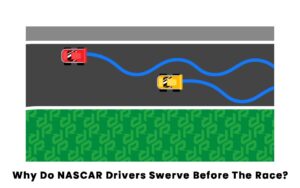What noise does a race car make? If you’ve ever wondered about the thunderous symphony that accompanies a race car tearing down the track, you’re not alone. The answer lies in the exhilarating combination of power, speed, and engineering prowess. As the engine roars to life, the exhaust system releases a cacophony of raw energy, reverberating through the air. The high-pitched scream of the engine reaches a crescendo, fueling the excitement of spectators and sending shivers down your spine. But there’s more to this sonic spectacle than meets the ear. Let’s dive into the captivating world of race car sounds and uncover the secrets behind their thrilling cacophony.
What Noise Does a Race Car Make?
The sound of a race car tearing through the track is an exhilarating experience for many motorsports enthusiasts. The roar of the engine, the screeching of the tires, and the high-pitched revs create a symphony that is uniquely associated with the world of racing. But what exactly is the noise that a race car makes, and what factors contribute to its distinct sound? In this article, we will explore the various elements that contribute to the noise produced by race cars and delve into the science behind this thrilling auditory experience.
The Engine: The Heart of the Noise
Race car engines are marvels of engineering, designed to deliver exceptional power and performance on the track. The engine plays a pivotal role in generating the characteristic noise of a race car. Let’s take a closer look at the different components of the engine and how they contribute to the overall sound:
1. Exhaust System
The exhaust system is one of the primary sources of sound in a race car. It consists of a series of pipes, mufflers, and components designed to channel and control the flow of exhaust gases. The exhaust system has a significant impact on the noise produced by the engine. Some key factors that influence the sound include:
- Header Design: The design and length of the headers can affect the exhaust note. Longer headers can create a deeper, lower-pitched sound, while shorter headers produce a higher-pitched tone.
- Mufflers: Race cars often utilize performance mufflers or straight pipes, which minimize restrictions in the exhaust flow, resulting in a louder and more aggressive sound.
- Backpressure: The amount of backpressure in the exhaust system can also impact the sound. Higher backpressure can create a deeper, throatier tone, while lower backpressure results in a sharper, more high-pitched sound.
2. Intake System
The intake system is responsible for delivering air into the engine. It plays a role in determining the sound produced by a race car. Here are a few factors that influence the noise generated by the intake system:
- Air Intake Design: The design of the air intake can affect the sound. Cold air intakes, for example, tend to produce a deeper, more resonant tone compared to stock intakes.
- Induction Noise: Race cars often incorporate induction kits or aftermarket air filters that enhance the engine’s intake noise, resulting in a more aggressive sound.
3. Engine Configuration
The engine configuration also has a significant impact on the sound of a race car. While there are various engine types used in racing, two of the most common configurations are:
- V8 Engines: V8 engines are known for their deep, rumbling sound. The firing order and cylinder layout contribute to this distinct tone.
- Inline Engines: Inline engines, particularly inline-four and inline-six configurations, can produce a higher-pitched sound due to their firing order and number of cylinders.
Tires: Squealing for Traction
In addition to the engine, the sound of a race car is influenced by the tires. As these high-performance machines navigate the corners and straightaways of the track, the tires emit a distinct squealing noise. Here’s why:
- Tire Composition: Racing tires are designed to provide maximum grip and traction. The specialized rubber compound used in racing tires generates a high-pitched squeal as it interacts with the track surface.
- Tire Pressure: Proper tire pressure is crucial for optimal performance. Incorrect tire pressure can result in tire squealing, affecting both the performance and sound produced by the tires.
Aerodynamics: Whistling through the Air
Another factor that contributes to the overall noise of a race car is aerodynamics. The design and aerodynamic features of race cars create additional sound effects. Here are a few key points:
- Airflow: As race cars speed down the track, the airflow around the vehicle produces various noise components. The interaction between the aerodynamic features and the air can result in whistling or whooshing sounds.
- Spoilers and Wings: The presence of spoilers and wings on race cars not only enhances downforce but can also create additional sound effects. The turbulence caused by these aerodynamic components contributes to the overall audio experience.
The Importance of Sound in Motorsports
The noise produced by race cars serves multiple purposes beyond the auditory thrill. It plays a crucial role in:
- Enhancing the Spectator Experience: The sound of roaring engines and screeching tires adds an adrenaline-pumping element to the motorsports experience. The visceral nature of the noise amplifies the excitement and engagement for spectators.
- Indicating Vehicle Performance: The sound of a race car can provide valuable insights into its performance. Motorsports enthusiasts often listen for specific engine notes to gauge the speed, acceleration, and agility of the cars.
- Safety Awareness: The noise produced by race cars serves as a safety feature, alerting drivers and track officials to their presence. By listening to the sound of approaching cars, participants can make informed decisions while on the track.
The Evolution of Race Car Noise
The sound of race cars has evolved over the years, influenced by advancements in technology, regulations, and environmental concerns. Here are a few notable changes that have impacted the noise of race cars:
- Engine Downsizing: In recent years, there has been a shift towards smaller, turbocharged engines in some motorsports. This change has resulted in a different sound compared to larger, naturally aspirated engines.
- Regulations and Exhaust Noise Limits: Various motorsport organizations have implemented regulations to control exhaust noise levels. These regulations aim to strike a balance between maintaining an exciting auditory experience and addressing concerns regarding noise pollution.
- Electric and Hybrid Technology: The rise of electric and hybrid race cars has introduced a new soundscape to motorsports. These vehicles produce unique electronic tones that differ from traditional combustion engines.
In Conclusion
The noise of a race car is a captivating element that enhances the overall motorsports experience. The combination of engine design, exhaust and intake systems, tire composition, and aerodynamics create a symphony of sound on the track. The evolution of race car noise reflects both technological advancements and the need to address environmental considerations. Whether it’s the rumble of a V8 or the high-pitched whine of an electric motor, the sound of a race car is an integral part of the thrilling world of motorsports.
WHY CAR MAKES HUMMING NOISE WHEN ACCELERATING or Driving
Frequently Asked Questions
What noise does a race car make?
A race car produces a distinct and powerful noise that is a result of its high-performance engine and exhaust system. The noise is often characterized by a deep rumble and a series of high-pitched revs.
How loud is the noise of a race car?
The noise produced by a race car can be extremely loud, reaching levels well above the average noise levels of regular road vehicles. It can easily exceed 100 decibels, which is equivalent to the noise produced by a chainsaw or a rock concert.
What contributes to the noise of a race car?
The noise of a race car is primarily generated by its engine, exhaust system, and the high-speed movements of various components. The engine’s combustion process, the exhaust gases traveling through the exhaust pipes, and the rapid rotation of the car’s wheels all contribute to the distinct noise.
Do different race cars make different noises?
Yes, different race cars can produce different noises depending on various factors. Factors such as engine type, exhaust design, and overall vehicle configuration can influence the sound. For example, a Formula 1 car produces a high-pitched scream, while a NASCAR stock car produces a deep, thunderous roar.
Is the noise of a race car affected by its speed?
Yes, the noise of a race car can vary depending on its speed. As the car accelerates, the engine revs higher, and the exhaust system works harder, resulting in a louder noise. Conversely, when the car decelerates or comes to a stop, the noise level decreases.
How can the noise of a race car be controlled?
To control the noise of a race car, various methods can be employed. These include using specialized mufflers or exhaust systems designed to minimize noise levels, implementing sound-dampening materials within the car’s structure, and adhering to specific noise regulations set by race organizers and governing bodies.
Final Thoughts
A race car produces a distinct and powerful noise that captures the attention of both enthusiasts and casual observers. The sound of a race car can be described as a symphony of roaring engines, screeching tires, and exhaust pops. It reverberates through the air, leaving an unforgettable impression. Whether it’s the high-pitched whine of a Formula 1 car or the thunderous rumble of a NASCAR engine, the noise of a race car is a thrilling experience that ignites a sense of adrenaline and excitement. So, what noise does a race car make? It’s a cacophony of raw power and speed that resonates with both competitors and fans alike.




